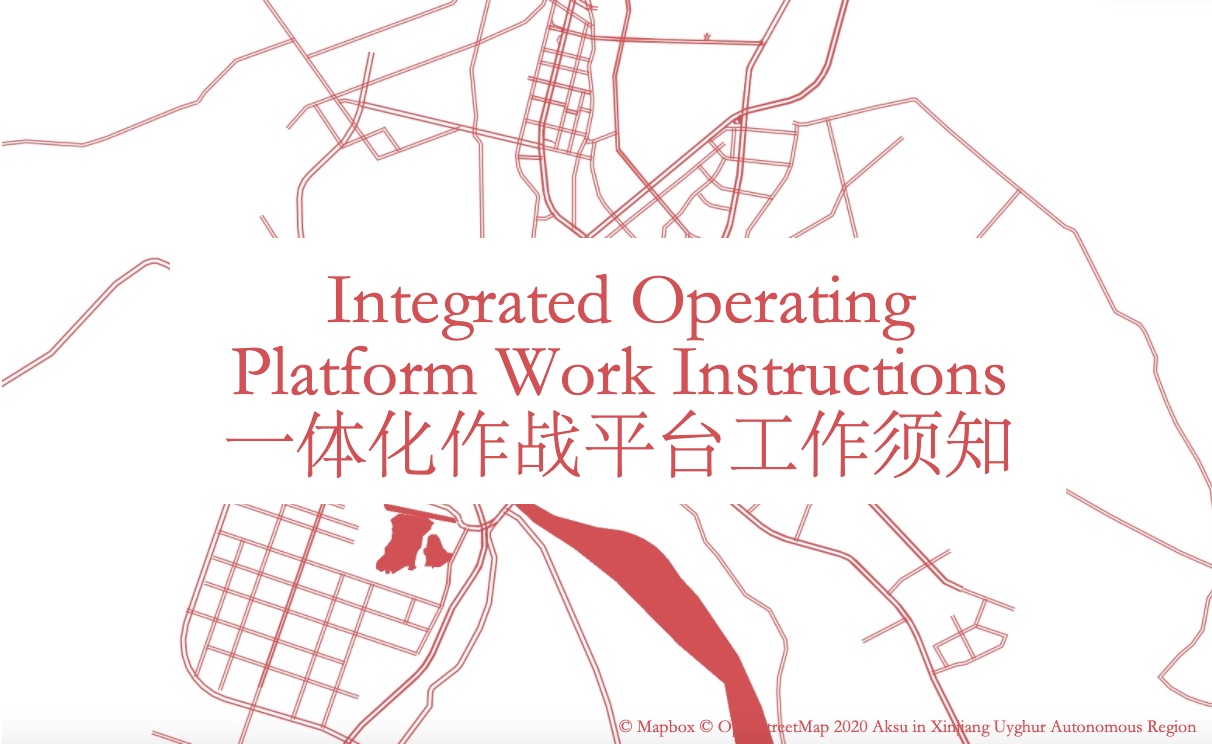
Introduction
This document instructs personnel carrying out surveillance for the Integrated Operating Platform, or Integrated Joint Operating Platform (IJOP), on how to monitor the activities of those termed “pushed individuals” by the platform. This information is collected and uploaded to the platform by civil servants at all levels, including police officers and officials carrying out house visits as part of the “Becoming Family” (访惠聚) campaign. IJOP pushes this data through the platform and state security organizations back to police stations and “Becoming Family” offices, which then pass along the information to the smaller units in which they live and work. The platform is highly efficient and grants statewide reach in its surveillance. According to one leaked IJOP document, between June 19th and 26th of 2017—just one week—the platform notified authorities about 24,412 individuals, resulting in 706 being detained as criminals and 15,683 being sent to receive “education and training.”
These instructions group these individuals into three categories of work: “backflow prevention” (防回流) targets those who have traveled to “26 key terrorism-related countries” (26个涉恐重点国家); “disconnected” (断通联) traces anyone suspected of using VPN software or other means of circumventing internet censorship; and those uncovered through “digging and shoveling” (挖减铲) have spent time in detention centers for terrorism-related charges. This terminology is related to the comments of religious affairs official Maisumujiang Maimuer, who called for a strategy of “digging up the roots” and unearthing those who might sow ideas of terrorism, extremism, and separatism among the population. Ultimately, these categories are ambiguous and allow authorities to surveil a wide range of people. For instance, in light of the multitude of reasons to report potential terrorists listed in an official document entitled “Learning and Identifying 75 Religious Extreme Activities in Parts of Xinjiang,” people pushed by IJOP as a result of “digging and shoveling” might include those charged with anything from wearing certain clothes to refusing to playing team sports and participating in religious celebrations. Moreover, surveillance personnel are also instructed to monitor students studying abroad and to target individuals who have recently become citizens of Kazakhstan. This second instruction supports the claim made in Human Rights Watch’s report on IJOP: “The use of mass surveillance extends beyond Xinjiang and into the Turkic Muslim diaspora as authorities pressure them to provide detailed information about themselves, including their address, phone number, and school or workplace.”
The Model Essay Center (范文中心), where this document was originally posted, collects essays and texts relevant to the training of low-ranking cadres. Many documents are posted by anonymous officials, making establishing their provenance difficult. However, in this case, similar descriptions of IJOP policy implementation appear in other state documents, such as this 2019 report from Nilka County in Northern Xinjiang. These IJOP work instructions provide a window into how the platform carries out surveillance and what kinds of data it collects. The archived version is available here. For more on IJOP’s surveillance activities, see the material on Operation 9.13 translated in our page on The ‘Four Togethers’ and ‘Three Gifts’ Handbook.
Translation of “Integrated Operating Platform Work Instructions”:
“Integrated Operating Platform Work Instructions”:
Acknowledgment
Thanks to Dr. Darren Byler for his assistance contextualizing some of the language in this document.